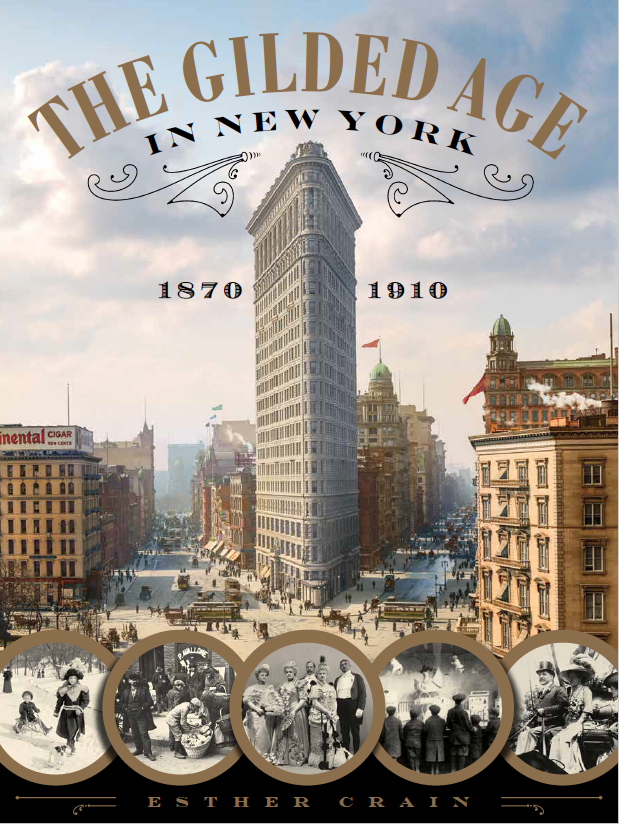It was September 1909 when New Yorkers in Times Square began noticing the colossal white figure, shrouded in scaffolding between 45th and 46th Street across from Cafe Madrid and the Hotel Astor.
By October, the white figure gained a female face and form. A statue was emerging in the city’s bustling new entertainment district—where glittery theaters, late-night lobster palaces, and enormous illuminated billboards had edged out the carriage-making trade that once called the former Longacre Square home.
A new monument wasn’t necessarily unwelcome; the city was filling up with them on Fifth Avenue, Riverside Drive, and public parks like Union Square. The problem, however, was that no one knew who the Times Square statue would honor or what it was supposed to mean.
“Shopkeepers on both sides of the square, restauranteurs and hotel men, theatrical men, and box office and ticket sellers questioned each other and everyone they met, but no one knew why or what the strange figure was to represent,” reported the New York Times on October 5.
The Times did a little digging, and an explanation appeared. The 50-foot plaster statue was the work of a young Italian-born sculptor, Leo Lentelli. It was commissioned by a recently formed civic group called the Association for New York.
The group’s purpose was to “challenge indiscriminate abuse and criticism of New York City,” according to the president, William Harmon Black.
What kind of criticism, specifically? That the city had poor credit and the “aspersions constantly cast upon the integrity and honesty of the municipal authorities,” said Black, who was also the president of the city’s Board of Aldermen (and would go on to hold numerous offices and appointments).
Erecting a statue in the middle of Times Square simply as “an artistic, silent exhortation to civic pride and confidence,” wrote the Times, raised many eyebrows. So when “Purity,” as the statue was named, had its official unveiling on October 8, newspapers had fun covering it.
“The new plaster Virtue got a real glimpse of Broadway, the Tenderloin, and the Rialto last night, when for the first time they knocked off the wooden shackles which bound her plastic form at the upper end of Times Square, threw half a dozen spotlights on her, and otherwise held her up to the public gaze,” the newspaper wrote, calling the statue by a different name.
“If she blushed she did not show it, and if those who saw her appreciated her kalsomined presence, it was only noticeable in their amused smiles.”
Puzzled Times Square visitors had their own thoughts about Purity. “‘Is she a suffragette?’ inquired a newcomer, according to one newspaper. ‘She’s got a look in her eye that means business.'”
While newspaper writers and savvy New Yorkers mocked the statue, its real purpose came to light: Tammany Hall, the corrupt Democratic political machine that dominated Gotham’s politics through the 19th and early 20th centuries, built it specifically for this election season. (Tammany’s corruption and influence is illustrated in the below cartoon from Puck in 1899.)
Purity “was commissioned by the notorious political gang of Tammany Hall, who figured it to be the best way to announce their ‘pure and noble’ intentions to the public after an opponent accused them of crooked practices,” states a 2016 article by New York Nimby.
Knowing for sure that Tammany Hall was behind the statue didn’t stop the mocking. One civic group announced it was putting up its own statue as a rival.
“The Committee of One Hundred announced yesterday that a plaster creation would be unveiled to-morrow in its exhibit on 16th Street as an answer to the ‘Miss Purity’ statue erected in Times Square,” wrote the Times on October 20. The statue “would represent Miss Purity prostrate, with the Tammany Tiger clutching at her throat.”
Purity was supposed to remain in place until December. But its plaster began deteriorating in the rain and wind not long after the unveiling. Once Election Day was over—and it proved to not be favorable to Tammany Hall—the statue was slated to meet the wrecking ball.
“Tammany’s defeat—for she was a Tammany daughter—must have made her sorrowful, and maybe she didn’t care whether she lived her full span out or not, concluded The Times on November 20.
Workmen took sledgehammers to Purity’s face and arms. A crowd formed to watch, and bill stickers began plastering her pedestal with advertisements, as they had a few days before the pedestal would be carried away. “Back to the dust pile for her, election being over,” the Times headline read.
The spot where Purity stood for all of two months became the site of a very different statue in 1937—that of Father Francis P. Duffy, chaplain for the city’s “Fighting 69th” infantry regiment. This end of Times Square has since been known as Father Duffy Square, with Purity long forgotten and Tammany Hall also in history’s dustbin.
[Top image: New-York Historical Society/Robert L. Bracklow Photograph Collection; second photo: Bain Collection/Library of Congress; third image: New York Times 1909; fourth image: New-York Historical Society/Robert L. Bracklow Photograph Collection; fifth image: Puck, 1899; sixth image: The Sun 1909; seventh image: New-York Historical Society/Robert L. Bracklow Photograph Collection]








